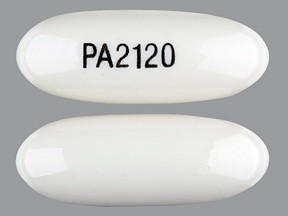VALPROIC ACID - ORAL
PHONETIC PRONUNCIATION: (val-PROE-ik As-id)
COMMON BRAND NAME(S): Depakene
GENERIC NAME(S): valproic acid
Uses
USES: This medication is used to treat seizure disorders, mental/mood conditions (such as manic phase of bipolar disorder), and to prevent migraine headaches. It works by restoring the balance of certain natural substances (neurotransmitters) in the brain.
How to use VALPROIC ACID - ORAL
HOW TO USE: Read the Medication Guide and, if available, the Patient Information Leaflet provided by your pharmacist before you start taking valproic acid and each time you get a refill. If you have any questions, ask your doctor or pharmacist. Take this medication by mouth as directed by your doctor. You may take it with food if stomach upset occurs. Swallow the capsule whole. Do not crush or chew the capsule, which can irritate the mouth or throat. The dosage is based on your age, weight, medical condition, response to treatment, and other medications you may be taking. Be sure to tell your doctor and pharmacist about all the products you use (including prescription drugs, nonprescription drugs, and herbal products). Use this medication regularly in order to get the most benefit from it. Remember to use it at the same time each day to keep the amount of medication in your blood constant. If this medication is used for seizures, do not stop taking it without consulting your doctor. Your condition may become worse if the drug is suddenly stopped. Your dose may need to be gradually decreased. This medication does not relieve acute migraine headaches. Take other medications as directed by your doctor for acute attacks. Inform your doctor if your condition does not improve.
Side Effects
Precautions
Interactions
Overdose
Images

- color
- off-white
- shape
- oblong
- imprint
- VALPROIC 250

- color
- off-white
- shape
- oblong
- imprint
- VALPROIC 250-0364
Reviews
Faq for VALPROIC ACID - ORAL
Valproic acid is an anticonvulsant medication used to treat seizures, bipolar disorder, and migraines.
Valproic acid works by increasing the levels of a neurotransmitter called gamma-aminobutyric acid (GABA) in the brain, which helps to reduce abnormal brain activity.
Yes, valproic acid has been associated with an increased risk of birth defects and developmental delays when taken during pregnancy. It is important to discuss the potential risks with your healthcare provider if you are pregnant or planning to become pregnant.
Common side effects of valproic acid include drowsiness, dizziness, headache, nausea, vomiting, stomach pain, and changes in appetite or weight.
Yes, valproic acid can interact with other medications, including some antidepressants, antipsychotics, blood thinners, and other anticonvulsants. It is important to inform your healthcare provider about all medications you are taking before starting valproic acid.
The effects of valproic acid can vary, but it generally takes a few weeks to see the full benefits. It is important to take the medication as prescribed and not to stop or adjust the dose without consulting your healthcare provider.
Yes, valproic acid can be used in children for certain conditions, such as epilepsy. However, dosing and monitoring may be different for children, so it is important to follow the guidance of a pediatric healthcare provider.
Valproic acid passes into breast milk and can potentially harm a nursing infant. It is generally not recommended to use valproic acid while breastfeeding, but individual circumstances should be discussed with a healthcare provider.
Drinking alcohol while taking valproic acid can increase the risk of certain side effects, such as drowsiness or liver damage. It is generally recommended to avoid or limit alcohol consumption while taking valproic acid.
Warning
WARNING: Rarely, this medication has caused serious (sometimes fatal) liver problems, usually within the first 6 months of starting treatment. Laboratory tests should be performed before you start treatment and periodically during treatment, especially within the first 6 months, to monitor this side effect. The risk of serious liver problems is increased in children younger than 2 years, especially if they have an inherited metabolic disorder, severe seizure disorder with mental retardation, organic brain disease, or if they take more than one seizure medication. Talk with the doctor about the risks and benefits of using this medication in children younger than 2 years. Due to an increased risk for liver problems, people with certain inherited metabolic disorders (such as Alpers-Huttenlocher syndrome) should not use this medication. Children younger than 2 years who might have these disorders should not use this medication. Children older than 2 years who might have these disorders should be closely monitored during treatment with valproic acid. Talk to your doctor for details. This medication has rarely caused severe (sometimes fatal) disease of the pancreas (pancreatitis). This may occur at any time during treatment and can quickly worsen. Tell your doctor right away if you develop symptoms of liver problems or pancreatitis such as unusual tiredness, weakness, swelling of the face, stomach/abdominal pain, loss of appetite, dark urine, yellowing eyes/skin, or persistent nausea/vomiting. Taking this medication during pregnancy can cause birth defects and may lower your child's IQ. Women of childbearing age should discuss the risks and benefits of this medication, other treatment options, and use of reliable forms of birth control with their doctor. If you are planning pregnancy, become pregnant, or think you may be pregnant, immediately talk to your doctor. If you are taking valproic acid only to prevent migraine headaches, this medication must not be used during pregnancy. If you are taking valproic acid to treat seizures or mental/mood problems (such as bipolar disorder), do not stop taking this medication unless directed by your doctor. Untreated seizures and mental/mood problems (such as bipolar disorder) are serious conditions that can harm both a pregnant woman and her unborn baby.
Disclaimer
IMPORTANT: HOW TO USE THIS INFORMATION: This is a summary and does NOT have all possible information about this product. This information does not assure that this product is safe, effective, or appropriate for you. This information is not individual medical advice and does not substitute for the advice of your health care professional. Always ask your health care professional for complete information about this product and your specific health needs.


No Reviews Yet